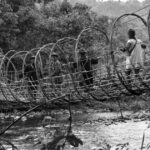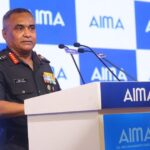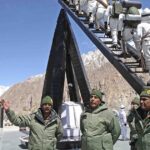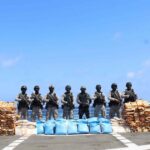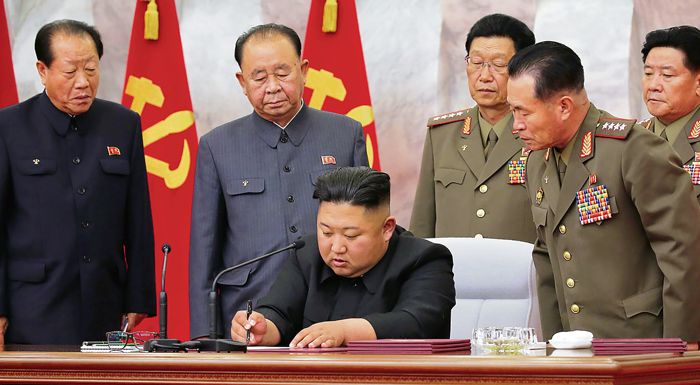
SOURCE: The Tribune
When Pyongyang sneezes, New Delhi catches a cold. Not all of New Delhi, but just the posh enclave of Greater Kailash II in the capital where the Embassy of the Democratic People’s Republic of Korea — popularly known as North Korea — is located. That is not all in the latest saga of the Hermit Kingdom’s curious twists in its long-standing, but oft-ignored, connections with India.
In April, the coronavirus pandemic, which has been dominating news cycles worldwide, briefly made way for news from North Korea. The prolonged absence from public view of its ‘Supreme Leader’ Kim Jong-un led to frantic speculation in television newsrooms from America to Australia that the third-generation Kim, who rules this unorthodox country, was sick.
If Kim disappeared from the public for three weeks, his loyal Ambassador in India, Choe Hui Chol, was not to be left behind. North Korea’s apparatchiks survive by being more loyal to their Supreme Leader than the Supreme Leader himself. So, if Kim decided to go off the public stage for 21 days, Choe preceded him. He also disappeared for longer.
There was only one problem. The vanishing trick by the envoy put protocol officials at Jawaharlal Nehru Bhavan, the spanking new headquarters of the Ministry of External Affairs in New Delhi, in a quandary. Here was an ambassador from a controversial and unpredictable nation which is under the lense of intelligence agencies of every major country in the world.
He had been appointed after due process in March last year after India cleared his Agrément — consent in foreign policy parlance to receive the head of a diplomatic mission — as soon as his name was proposed by Pyongyang. Choe arrived shortly thereafter, but would not seek an appointment with President Ram Nath Kovind to present his credentials as ambassador. Erratic behaviour that North Koreans are, of course, notorious for.
Recently, a high commissioner from South Africa had arrived at the country’s mission in New Delhi, but without a letter of credence and could not, therefore, go to Rashtrapati Bhavan to present it. Eventually, South Africa’s President changed his mind about the appointment and the High Commissioner-designate went back home without being accredited. But this diplomat was in limbo for a much shorter period than the new North Korean envoy.
Choe has now become the longest Ambassador-designate in India’s diplomatic history. He may have chosen to wear this unusual honour on his sleeve, but the problem for Indian protocol officials was that without presenting his credentials, the Ambassador-designate was on diplomatic no-man’s land.
Convention dictates that until an envoy has presented his credentials to the Head of the State of the receiving country, he cannot personally conduct any official business with his hosts. That meant Choe could not meet any Indian officials. Nor could he meet other envoys resident in the Capital or attend functions like National Days of other countries.
A bigger worry was what if — a big if — Choe got into any mischief in India. That possibility could not be ruled out, given the history of North Korea’s nefarious activities, hand in glove with Pakistan in the proliferation of weapons of mass destruction, notably missiles and nuclear components. Pyongyang is also an ally of Beijing.
Without credentials, the Ambassador-designate would have no diplomatic immunity and for Indian protocol, Choe could cause not just headaches, but severe migraines, if something went wrong while he was in limbo at his mission.
When I asked for a meeting with Choe some months after his nomination was announced, the North Korean Embassy in Greater Kailash II enthusiastically agreed. But the meeting never took place because officials kept postponing the appointment.
More recently, the request was renewed, but at that time, an official mysteriously contradicted his colleagues on earlier occasions and said Choe was yet to arrive. Obviously, the Hermit Kingdom’s diplomatic outposts are no less hermetic than its main seat of power where Kim sits. But from my experience, stretching back to the 1990s, a visit to the North Korean Mission can be an intimidating experience.
But all is well that ends well. Three weeks after Kim reappeared in public, putting an end, howsoever temporarily, to rumours of his sickness, the Supreme Leader’s trusted envoy also reappeared. As mysteriously as he went underground for 15 months since his appointment, Choe resurfaced.
This time, he asked Rashtrapati Bhavan to arrange his credentials ceremony. But by then, coronavirus had already changed everything. The President’s office decided to dispense with the formal ceremonies associated with accreditation in person until the Covid-19 threat abated.
A fortnight ago, Choe became the first Ambassador in India’s history to deliver his credentials to the Head of State ‘through the digital medium’, according to Ajay Kumar Singh, Press Secretary to the President.
The mystery that has surrounded Choe since his appointment has meant time lost after the then Minister of State for External Affairs VK Singh’s visit to Pyongyang in May 2018 appeared to be a harbinger of elevated relations between New Delhi and Pyongyang. Prior to Singh’s visit, India signalled a desire to strengthen bilateral ties by sending an Indian Foreign Service officer as Ambassador to Pyongyang after a long gap.
This step was a significant departure from the practice of sending interpreters, and on one occasion, even posting a stenographer as Ambassador to North Korea. The upgrade in diplomatic representation was not lost on the Kim regime. Atul Gotsurve was invited to present his credentials as Ambassador immediately after his arrival in Pyongyang. Usually, arriving envoys wait for months before they are called to the Foreign Office to be formally accredited to start work in the world’s most reclusive state.
Choe is the seniormost Communist apparatchik from Pyongyang to be sent as envoy to India. He was North Korea’s Vice-Minister of Foreign Affairs before being posted to India, with critical experience of European affairs during a period when Pyongyang’s outlets to the West were through the UK and France.
Having demonstrated his total fealty to Kim by even showing a propensity to disappear in tandem with the Supreme Leader, this very senior official, handpicked for the job in New Delhi, may yet do more than what any of his predecessors did for North Korea-India relations.
https://defencenewsofindia.com/when-n-korean-envoy-did-vanishing-trick/


